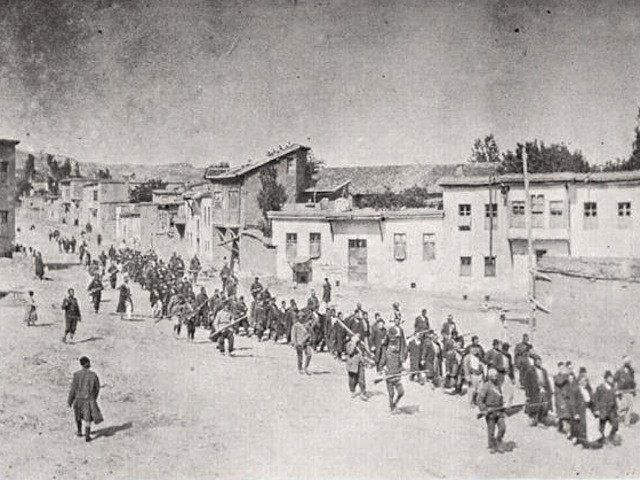This article originally appeared at the Assyrian International News Agency.
On April 24, 1915 the Turkish genocide of Assyrians, Greeks and Armenians began very simply, without pomp and circumstance. “We have made a clean sweep of the Armenians and Assyrians of Azerbaijan.” Those were the words of Djevdet Bey, the governor of Van Province in Ottoman Turkey, who on April 24, 1915 lead 20,000 Turkish soldiers and 10,000 Kurdish irregulars in the opening act of the genocide of Assyrians, Armenians and Pontic Greeks. In three short years, 750,000 Assyrians (75%) would be killed, 1.5 million Armenians and 500,000 Greeks.
On April 24 Assyrians, Greeks and Armenians will commemorate the 100th anniversary of the genocide with vigils, church services, lectures, demonstrations and personal reflection.
Much progress in recognizing the genocide has been made throughout the world since 1915:
- Syria Recognizes the Armenian Genocide Committed By the Ottoman Empire, Parliament Speaker Says
- Austrian Parliament Recognizes Armenian, Assyrian, Greek Genocide
- Czech Parliament Panel Passes Genocide Centenary Resolution
- European Parliament Votes to Recognize Armenian, Assyrian, Greek Genocide
- Dutch Parliament Recognizes Assyrian, Greek and Armenian Genocide
- Pope Francis Recognizes Armenian, Assyrian, Greek Genocide
- Armenian Government Recognizes Turkish Genocide of Assyrians and Greeks
- Sweden Recognizes Assyrian, Greek and Armenian Genocide
- International Genocide Scholars Association Officially Recognizes Assyrian, Greek Genocides
But recognition for the genocide by the most important country has not been made. Turkey has not only denied the genocide, but has actively worked to block its recognition throughout the world. In February, 2013 the Turkish EU minister Egemen Bagis compared the Assyrian genocide with the act of masturbation (AINA 2013-02-26).
That the genocide occurred is beyond dispute. The evidence comes from multiple sources. The genocide was recorded by Arnold Toynbee, famed British historian, as well as countless American and German missionaries. Toynbee’s document runs for more than 600 pages and is entitled, “Arnold Toynbee Papers and Documents on the Treatment of Armenians and Assyrian Christians by the Turks, 1915-1916, in the Ottoman Empire and North-West Persia.” The national archives of the British, French and American states contain a large collection of documents related to the genocide. The Diplomatic French archives, for example, included 45 volumes on the Assyrian question from 1915 to 1940.
Peter BetBasoo is the founder of the Assyrian International News Agency, which covers news regarding the Assyrian and greater Mideast Christian communities.
Read the full article at the Assyrian International News Agency.

COMMENTS
Please let us know if you're having issues with commenting.